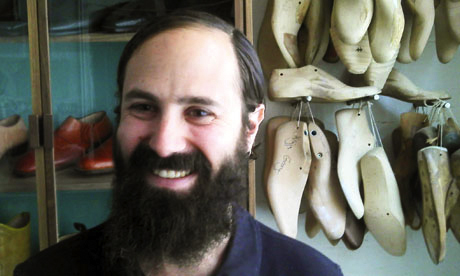Shoemaker Sebastian Tarek on why his trade is ‘in the blood’

Shoemaker Sebastian Tarek
Sebastian Tarek wants you to wait four months for a pair of shoes.
“The first pair always takes a good four months. Subsequent pairs can be done a bit quicker quite often.”
That still won’t come as much of a relief to twitchy modern-day shoppers who like their gratification instant and their footwear habits quickly satisfied.
Sebastian has been making shoes out of a studio at the 114-year-old Sunbury Workshops in Shoreditch for the last six years. “All of London’s shoemaking history is in this area,” he said. He launched bespoke label Sebastian Tarek Bespoke Shoes at London Fashion Week three years ago.
In 1994, on a rugby tour to the UK and in danger of ‘bombing out’ of high school, flat-footed Australian Sebastian had an epiphany watching shoe-making extravaganza Hans Christian Anderson on Christmas Day while staying with relatives in Surrey. When he later discovered that his family had been shoemakers since the 15th century, he knew he had found his niche. “It’s in the blood,” he says.
He sources his leather largely from the oldest leather merchant left in Northampton, the traditional home of English shoemaking. His bottom leathers for soles and heels come from the last-remaining oak-bark tanner in the UK – J & FJ Baker & Co of Coylton in Devon. The wooden lasts that he whittles down to meet the customer’s measurements and define the shape of the shoe come from an English last maker.
“Everything about old-fashioned shoe making is old fashioned. There’s not a whole lot of contemporary innovation that’s forced its way into it. You can still make a pair of shoes the same way you did 200 years ago.”
He works with men’s retailer Hostem in Redchurch Street. It’s a relationship perfectly in step with the age-old bespoke traditions where a prominent tailor would also feature a men’s footwear concession.
Reduce, reuse, recycle…repair?
Repairing shoes rather than tossing them in a landfill is certainly a great way to help the environment. The fact that bespoke shoes can be repaired is one of their biggest selling points. “You can have a beautiful pair of commercially made shoes which can last as long as the materials can but once those materials give up, the shoe is pretty much dead. A pair of commercially-produced shoes is made with an in-built finality because otherwise no one would buy another pair of shoes. That’s the economy of the fashion industry.”
But even for die-hard environmentalists, £1500 to get into a pair of his custom-made brogues or £1600 to do some walking in his handmade boots might cause a few heart palpitations.
Sebastian understands it’s a big cost for most people who might like to try bespoke for the first time but trying to make a competitively priced unit when everything about the shoe has been made by hand from start to finish is difficult, if not impossible.
“With bespoke, you have a pair of shoes that could last you 20 or 30 years if you look after them right. I mean, you may have to have them patched but they’re made purposefully to last as long as possible.”
